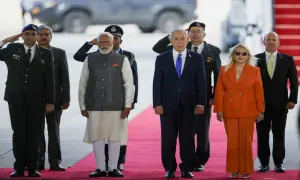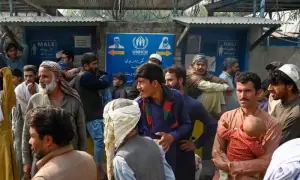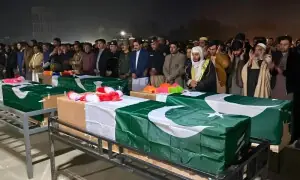9th Muharram processions conclude peacefully amid tight security
3 min readAcross Pakistan, the 9th of Muharram was observed with deep reverence and solemnity to honour the martyrs of Karbala.
Major cities, including Karachi, Lahore, Islamabad, Peshawar, Quetta, and Rawalpindi, witnessed the peaceful culmination of mourning processions amid strict security arrangements on Saturday.
In Islamabad, the main procession commenced from Jamia Isna Ashari Imambargah in G-6 and returned to the same point after passing through its designated route.
Mourners paid tribute through nohas and symbolic acts of devotion, while arrangements for langar, sabeel, and medical camps were made along the route.
The procession was secured by police, Rangers, and FC personnel, with aerial surveillance, walkthrough gates, and a central control room in place.
Karachi: Thousands attend procession
In Karachi, the central procession began from Nishtar Park, following its traditional route through MA Jinnah Road and concluded at Hussainian Iranian Imambargah.
Preceding the procession, a majlis was addressed by Allama Shahenshah Naqvi, who highlighted the sacrifices of the martyrs of Karbala.
The procession was led by Pak Hyderi Scouts, with participants offering namaz-e-zuhrain at Imambargah Ali Raza, where ISO members torched flags of the US and Israel.
Over 5,000 police personnel, along with Rangers and snipers on high-rise buildings, ensured security.
Markets and roads along the route were sealed, and mobile services were suspended in sensitive areas.
Sindh Interior Minister Zia-ul-Hassan Lanjar, Mayor Karachi Murtaza Wahab, and IG Sindh reviewed arrangements.
Peshawar: Tight security for processions
In Peshawar, processions began from Husseinia Hall and Imambargah Bibi Sahiba, passing through traditional routes and concluding peacefully.
Security was ensured with 12,000 officers, drone surveillance, and CCTV coverage.
IGP Zulfiqar Hamid visited the procession site and noted that over 50,000 personnel were deployed province-wide, with 14 districts marked sensitive.
Hangu & Orakzai: Army & FC deployed for safety
In Hangu and Orakzai, all processions concluded peacefully. Around 6,000 security personnel, including FC and army, were deployed.
Mobile services were suspended, and main streets were sealed off to ensure foolproof security.
Quetta: Main procession ends peacefully
In Quetta, the Zuljanah procession started from Imambargah Nasir-ul-Aza and ended at the same point.
Roads were sealed, and police, FC, and Balochistan Constabulary ensured security. Mobile services remained suspended until 10pm, and Safe City cameras monitored the routes.
Lahore: Largest-ever security plan
In Lahore, the main procession originated from Pando Street, Islampura, and concluded at Khaima-e-Sadat.
Mourning rituals, including noha khwani and matam, continued throughout the route. Police installed walkthrough gates, razor wire, and containers to secure the area.
According to the Punjab Police spokesperson, 1,689 processions and 3,895 majalis were held with over 100,000 police officers deployed.
Lahore alone saw 79 processions and 378 majalis, guarded by 10,000 personnel.
The IG Punjab emphasised strict enforcement of Section 144, Code of Conduct, and Loudspeaker Act, supported by Safe City cameras and real-time monitoring.
Punjab Chief Minister Maryam Nawaz oversaw what officials called the largest-ever Muharram security plan in the province’s history.
The Interior Ministry reported 2,763 processions and 7,598 majalis across the country.
Around 1,129 areas were declared highly sensitive, and advanced surveillance methods, including drones and facial recognition, were employed.
Interior Minister Mohsin Naqvi, Minister of State, and the Interior Secretary personally monitored the situation.
According to sources, 61 majalis, 17 processions were held in Islamabad.
In Punjab, a total of 3,805 majalis and 1,677 processions were arranged.
In Sindh, 1,207 majalis and 644 processions were taken out, while in KP, 939 majalis and 261 processions were arranged.
In Balochistan, 115 majalis and 11 processions were staged, while in Gilgit-Baltistan & AJK, processions and majalis were held across multiple districts.
Mohsin Naqvi reiterated a zero-tolerance policy on hate speech and sectarianism, vowing to foil any foreign-sponsored unrest.
Rawalpindi: 24/7 monitoring
Rawalpindi’s Safe City Centre remained active around the clock with over 2,400 cameras monitoring the city.
An additional 700 cameras were installed in coordination with the district administration.
Officials from 21 departments, including police, Rangers, Rescue 1122, WAPDA, and waste management, were stationed at the control room.
High-tech systems like facial recognition, plate tracing, and AI surveillance tools were used.
For the latest news, follow us on Twitter @Aaj_Urdu. We are also on Facebook, Instagram and YouTube.




























Comments are closed on this story.